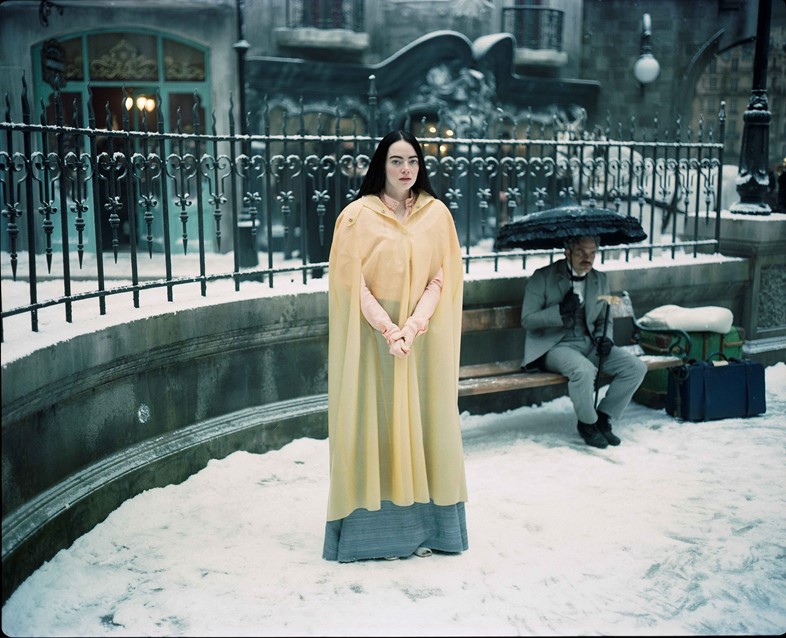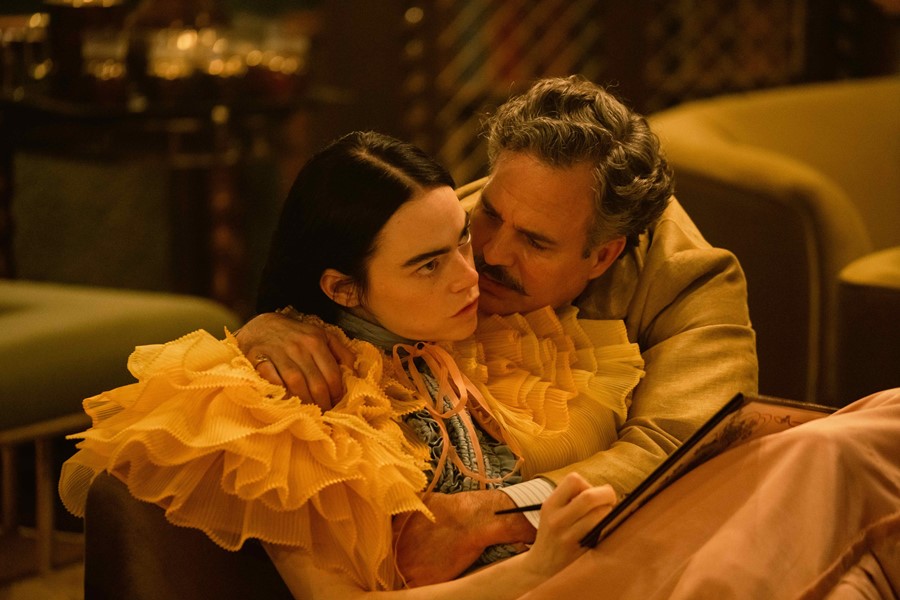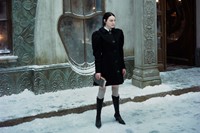Debuted at Venice Film Festival, Poor Things is a trenchantly funny new feature that tackles still-current ills of sexism, colonialism, cynicism and militarism head on
Frankenstein is the name of the monster, not the creator, mansplainers since the dawn of time love to remind us. But in Yorgos Lanthimos’ gender-swapped take on the gothic tale, it’s the mad scientist who gets the stitched-up face: played with a wonky Scottish accent by former AnOther Magazine cover star Willem Dafoe, his Godwin Baxter resembles nothing so much as a botched restoration of an Easter Island head. His creation, the beautiful Bella Baxter (Emma Stone), is the reanimated corpse of a pregnant young woman who recently jumped from a bridge, and whose unborn baby’s brain he swaps for her own.
Adapted from Alasdair Gray’s Victorian-era satire of the same name, Poor Things an antic, libidinous affair that rivals the Greek director’s Oscar-winning last film, The Favourite, in imparting tragicomic force to his trademark theatre of the absurd. (Lanthimos could have a great second career devising morally objectionable psychological experiments.) But for its wickedly funny first half, it’s his breakthrough Dogtooth the film most recalls, as Bella, who is forbidden to leave the house, pushes at the limits of her confinement. What follows are scenes of unnerving physical comedy, the childlike Bella’s accelerated mental development gifting her first with a hilarious, slanted relationship with the English language and then with an unslakable thirst for sexual discovery. It’s a joy seeing Stone, the undersung star of The Favourite, grapple with the character’s impulsive, herky-jerky physicality while delivering lines like “Bella discover happy when she want!”, just after learning to masturbate with a cucumber. (Much has been made of the sheer amount of nudity in the film, but it could hardly be otherwise: sex is kind of the whole point.)
To study her development, Godwin charges a young medical student, the hapless Archie McCandles, with shadowing her every move at home. Of course, he soon falls in love with her – well, maybe ‘love’ is the wrong word – which the wily surgeon uses to his advantage by conniving their engagement to be married. Before they can tie the knot, a shifty lawyer called Duncan Weddeburn (Mark Ruffalo, displaying a great comic touch) shows up to spirit her away on a sex-fuelled cruise around Europe, an elopement Bella announces to her creator (‘God’, as she calls him) by announcing her intention to run away in secret.

But while Bella is unambiguously the heroine of the piece, it’s men and their abysmal list of ‘isms’ that go under the knife in Poor Things, the trenchantly funny script sending up still-current ills of sexism, colonialism, cynicism and militarism, to name just a few. “We are men of science!” barks Godwin in one scene, suppressing his fatherly feelings for the girl. “This emotionality is unseemly.” Weddeburn and, to an extent, Archie fall for Bella because she is that fantastical meeting point of childlike innocence and sexual voraciousness, giving her body freely while appearing (if not really being) a blank canvas upon which they can bestow their dubious wisdom.
But as Bella’s mind expands on their cruise filled with “furious jumping” (Bella’s preferred term for sex), the tables are turned as the philandering Weddeburn grows mad with rage and desire at his new paramour’s seemingly inexplicable behaviour. Leaving him behind to take up sex work in a Parisian bordello, she learns more about the ways of men through fucking. (One scene, in which a man teaching his kids how to have sex by bringing them to the brothel, proves Lanthimos has lost none of his taste for transgression.) But when Bella returns home upon learning that Godwin is ill, the question of her past rears its head and she must decide what to do with her future.

Gray’s novel is an excellent fit for Lanthimos’ vision as a director: his feeling for the shifting sands of sexual power dynamics, his career-long obsession with language and its odd, imprisoning qualities. The film looks like a dream, conjuring a kind of looking-glass Victoriana through some exquisite costume and set design, and shows heart in moments where Bella remembers scenes from her past as if through muscle memory. That said, there’s a sense the script isn’t quite as on-point when wrestling with Bella’s later existential quandaries, and it suffers a little from the novel’s problem of serving up fringe characters as ciphers. I was likewise unsure about the ending, whether it was too glib, somehow – but these are minor niggles in a film that serves up a feat for the eyes, heart and brain. “Always carve with compassion,” says Godwin in the film, a monster finally softening a little in his old age. It’s a code Lanthimos increasingly seems to live by.
Poor Things is out in UK cinemas on 12 January 2024.






